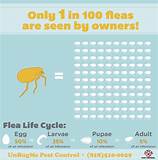How Long After Spraying Pesticides Is It Safe for Pets?
Pesticides are commonly used to control pests in homes, yards, and gardens. While these chemicals can be effective at eliminating pests, they can also be harmful to pets if they are not used properly. It is important to know how long after spraying pesticides it is safe for pets to be in the treated area.

How Pesticides Work
Pesticides work by killing or repelling pests. They can be applied to plants, soil, or surfaces. Once applied, pesticides can remain active for a period of time, which can vary depending on the type of pesticide and the conditions in the environment.
Pesticide Toxicity
The toxicity of a pesticide is a measure of how harmful it is to living organisms. Pesticides can be toxic to pets through several routes of exposure, including ingestion, inhalation, and skin contact. The severity of the effects of pesticide poisoning will depend on the type of pesticide, the amount of pesticide that the pet is exposed to, and the pet's individual sensitivity to the pesticide.
Signs of Pesticide Poisoning in Pets
Signs of pesticide poisoning in pets can include:
- Vomiting
- Diarrhea
- Loss of appetite
- Lethargy
- Tremors
- Seizures
- Difficulty breathing
- Skin irritation
How Long After Spraying Pesticides Is It Safe for Pets?
The length of time that pets should be kept out of a treated area will depend on the type of pesticide that was used and the instructions on the pesticide label. In general, it is best to keep pets out of the treated area for at least 24 hours after spraying. This will give the pesticide time to dry and dissipate.
Precautions for Pet Owners
To protect your pet from pesticide poisoning, you should take the following precautions:
- Read and follow the instructions on the pesticide label carefully.
- Keep pets out of the treated area for at least 24 hours after spraying.
- Wash your hands thoroughly after handling pesticides.
- Do not allow pets to eat or drink from surfaces that have been treated with pesticides.
- If you think your pet has been exposed to pesticides, call your veterinarian immediately.
Conclusion
By following these precautions, you can help to protect your pet from pesticide poisoning. If you have any questions about the use of pesticides around pets, talk to your veterinarian.
Declaration: All article resources on this website, unless otherwise specified or labeled, are collected from online resources. If the content on this website infringes on the legitimate rights and interests of the original author, you can contact this website to delete it.





